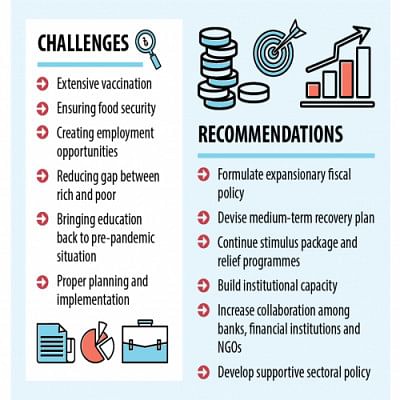Govt has an uphill battle ahead

The national budget for 2021-22 is being proposed today all the while the country's economy faces some tough realities stemming from the pandemic's second wave.
The hardships demand a bigger social safety net, policy support and incentives for many industries, improvements in health and education and so on, according to economists.
Small businesses and people of a middle socioeconomic status remain under pressure while many have been downed to financial insolvency, giving rise to higher inequality in the economy.
In the present fiscal year, the pandemic has pushed forth many new costs for the government.
With tax cuts and the National Board of Revenue (NBR) already lagging behind in attaining targets, revenue collection and mobilisation for reaching goals would be a big challenge in the upcoming year.
Coupled with it are job creation, investment, budget deficit management and foreign aid utilisation. Agriculture and remittance were the strengths of the economy but how the contributions of the two sectors would be kept strong should be clarified.
In a pandemic it is normal for government expenditure to increase but if aid does not arrive from all plausible sources, there could be an imbalance, said Kazi Iqbal, director of research at the Bangladesh Institute of Development Studies (BIDS).
Total revenue mobilisation recorded 13.4 per cent growth during the first 10 months of fiscal 2020-21 against the annual target of 43.7 per cent, according to data from the Ministry of Finance.
"Bringing foreign investment to the country in the next financial year will be a big challenge," said Iqbal.
Foreign grants registered negative growth of 69.7 per cent during the July-April period of the fiscal year, the data shows.
"The economy will depend entirely on how long the pandemic stays in the next financial year," he said.
There will be a large budget allocation from the government in the health sector where there may be disruptions in their payments to other sectors, he said, adding that larger projects can come at a slower pace.
As business has shrunk and government spending increased, it will be interesting to see how the government meets the big deficit challenge, Iqbal added.
Fiscal 2020-21 is different because the economy has been suffering from Covid-19, said Prof Sayema Haque Bidisha of the University of Dhaka.
"If we talk about the recovery of the economy, it is quite promising. On the positive side, Bangladesh has not been able to make as much of a negative impact on the economies of other countries as the novel coronavirus has," she said.
"However, the recovery of all sectors in Bangladesh was not same," she pointed out.
Agriculture, remittances have made important contributions. "And in the case of incentives, I have seen that it has been implemented in the case of big sectors. Not so with the little ones. However, a good aspect is that the small sectors depend on the big ones," said Prof Bidisha.
"And if we talk about the challenge -- that is the challenge of employment. Rich-poor inequality existed before. But with the advent of the novel coronavirus, that income inequality has widened," she said.
There have been problems in the health sector before, but the challenges have obviously come to the fore since the novel coronavirus came, she said.
Another sector is education. "Last year, we didn't talk much about this sector. But now it is seen that this sector is in a very bad condition," she said.
"The economy will do well in the next financial year if we can work on food security management, health facilities and education management and human employment in a big way," she added.
The increase in poverty is a major problem, said Rizwan Rahman, president of the Dhaka Chamber of Commerce and Industry (DCCI).
About 60 per cent of the urban population lost their jobs and livelihoods due to the lockdown, he said.
Pointing at sluggish private sector credit growth and falling capital machinery import, he said many sectors, namely printing and publishing, tourism and hospitality, restaurant and leather, lost their capital due to the Covid crisis.
"The cottage and micro entrepreneurs went out of business due to the Covid crisis. Because they are not bankable, stimulus support hadn't reached them," said Rahman.
"If the vaccination programme could reach at least 50 million people, the economy can be reopened at home as well as to foreign counterparts," he opined.
The main target of the upcoming budget should be rehabilitation of the manpower who lost their jobs during the last two years, said Rahman.
He also suggested creating an enabling environment and providing financial and technical support to the cottage and micro entrepreneurs.
"Due to the second wave of Covid-19, business of local businesspeople was not at a satisfactory level. Therefore government revenue collection target in the coming budget should not be increased further," he said.
"We are hopeful that the Bangladesh economy has the potentials to grow faster and further if adequate government support is available through budgetary and other policy mechanism," said Rahman.
"The mindset of our bureaucracy and policymakers has to be changed from the existing controlling mode into a supporting mode," he recommended.
"We have to formulate our budget taking into consideration the second wave and global development," said Towfiqul Islam Khan, research fellow at the Centre for Policy Dialogue (CPD).
"We have seen a slow recovery globally. It happens in a K-shape recovery. Everywhere in every sector it isn't happening alike," he said.
Khan said the extensional fiscal policy should be pursued in key sectors like health, social protection, agriculture and small and medium enterprises (SME) for employment generation.
"Normally we devise year-long plans. But we need a medium-time recovery plan in place of this year-long strategy," he said.
"We need to give importance to education, where medium-term damage has been made, and we have to continue the use of those stimulus package, relief programmes we have," he said.
"Normally the government focuses on acquiring economic growth. But this time government should focus on people's employment generation and income recovery at household level," said Khan.
"It's not gone well to give allocation only. We have noticed that the government can't spend as per the budgetary allocation. More than 70-80 per cent allocation remained unused," he said.
Production has had a positive growth but it is less than that of the previous year, he said.
"If we get to see the indicators of the investment, we are in a troubled spot. If we see the private sector, capital machineries, the growth of all is in a subjugated position or has been decreased compared to the previous year," said Khan.
"A positive indication in export has come, we have seen a turnaround. We have to keep in mind that it is more than 2020 but we can't go back to the level of 2019. The recovery has not been made fully," he warned.
According to Export Promotion Bureau (EPB) data, export earnings increased by 8.7 per cent during the July-April period of FY2021 against an annual target of 21.8 per cent.
"We have seen this time around that the income of people has come down; there was an uncertainty about employment; people have had to break into their savings," said Khan.
"At the same time, we have seen an increase in price inflation, particularly in the case of health-related expenditure. It creates a huge pressure on mass people and that's a matter of concern undoubtedly," he said.
The fiscal year started with a food inflation of 5.43 per cent at the national level, which gradually crept up to 5.73 per cent in April.
Finally, there have been some positive indicators in case of external balance. For example, export and import drifted towards positive trends, the condition of remittance was good.
On the other hand, overseas migration, machinery imports and foreign direct investment (FDI) underwent a negative trend.
"In the first nine months of the year we can say that the economy was moving forward at a good pace. January-February also progressed at a good pace," said Mahtab Uddin, a lecturer of the department of economics at the University of Dhaka.
"However, in April, May and June, the economy suffered a major setback. A few things are very positive. Our main market is Europe, America and Japan. But these countries have turned around. The economy is expected to bounce back from July," he said.
"If we can't handle the coronavirus situation, we have to fall into a bad situation again. Which we can see when we look at our neighbouring country India," he warned.
"Our main challenge will be on the health grounds. And two concerns are very alarming. Business costs. It has increased. Another issue is employment. It will be a big challenge," he added.



 For all latest news, follow The Daily Star's Google News channel.
For all latest news, follow The Daily Star's Google News channel. 








Comments